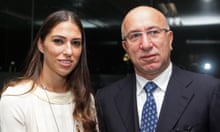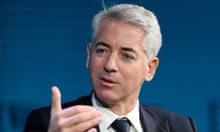A “frothy” US market for so-called “Spac” investment companies could end poorly for some investors, with the trend a risk to UK investors if plans to liberalise market rules go ahead, according to the chief executive of the London Stock Exchange.
The proposals regarding special purpose acquisition companies (Spacs) – “blank cheque” shell companies that raise money first and seek businesses to buy later – were announced earlier this week as part of a sweeping package of reforms designed to attract more fast-growing companies to list in London, in an attempt to maintain the UK’s position as a leading global financial centre post-Brexit.
The popularity of creating Spacs has proved to be a hot trend in global finance over the past year. In January alone, new listings raised $26bn (£18.8bn) from investors in the US, almost a third of the record $83bn collected by 248 Spacs in 2020. The basketball star Shaquille O’Neal, the former Cosmopolitan editor Joanna Coles and Martin Luther King Jr’s son have been among those involved in launching Spacs.

“I’m not the first person to say this but there is clearly some froth in the US market for Spacs and some of that could end poorly for some of those opportunities and those investors,” said David Schwimmer, the chief executive of the London Stock Exchange Group (LSEG), when asked if he felt the Spac phenomenon is a bubble.
“I think it is important to recognise that Spacs are a useful tool in the capital markets toolkit. They are one way of companies getting access to public markets in a way that is a little different from an initial public offering (IPO). Having said that, I think it is important [to recognise] that we see speculative cycles in markets over the years. But Spacs do have a role to play and it is important investors and market participants use them thoughtfully and carefully.”
Schwimmer welcomed the wide range of measures announced in the review, conducted by the former EU financial services commissioner Lord Hill for the chancellor, Rishi Sunak. Measures include allowing dual-class structures more attractive to company founders looking to keep control after listing, and lowering the amount of shares that must be sold to the public from 25% to 15%.
“London is a great market, the UK is a great market,” Schwimmer said. “We have a lot of great companies that have formed here, that have set up here, and because of some of the aspects of the [current] listing regime they feel that in some cases tempted to go elsewhere, and we want to make sure we avoid that temptation and can welcome them here.”
Schwimmer also said that LSEG, which is merging the operations of its £22bn acquisition Refinitiv, is reviewing its office space needs outside London as it also looks to introduce a flexible working regime after the coronavirus crisis.
“In the UK we will certainly be keeping our presence and headquarters in Paternoster Square and keeping our presence in Canary Wharf,” he said. “There are a number of other locations that we have across the UK that we are reviewing as part of integration planning. At the appropriate time we would like to be getting our people back into offices. We will also have more flexibility going forward. The pandemic working environment has demonstrated that we can get a lot done with a more flexible working environment.”
The company said it employed 3,927 staff as of the end of 2019. It has offices in cities including Edinburgh, Exeter and Nottingham, as well as data centres in locations across the UK.
Earlier this year, Amsterdam overtook London as Europe’s largest share trading centre, which was perceived as a symbolic blow to the UK’s status as a financial powerhouse following Brexit.
“This was well telegraphed, not surprising and was a result of the share trading obligation under the EU regulation,” said Schwimmer.
“I think that there is no question that London remains one of the world’s leading global financial capitals. It continues to have the strength, the critical mass, the expertise, the very pragmatic and reasonable regulatory regime, and the legal system relied on by businesses and market participants all over the world. We as a global company headquartered in London feel very comfortable with its position as a global financial capital.”










